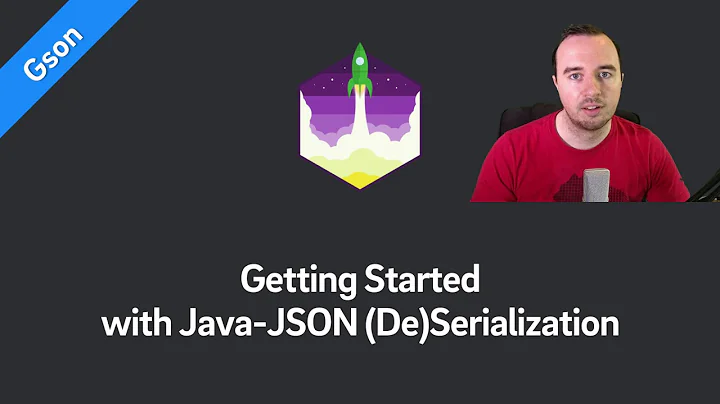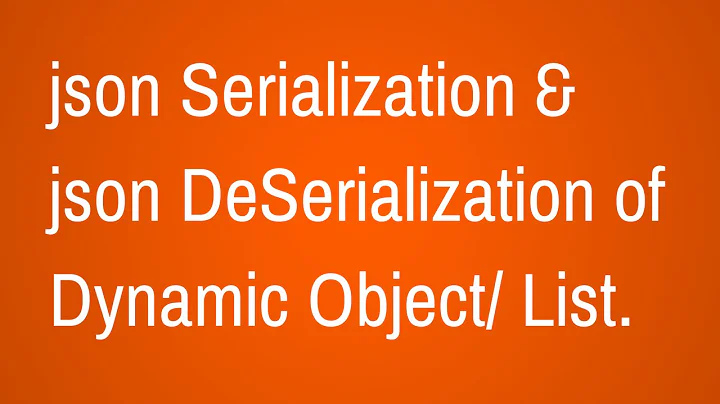Json.Net Serialization of Type with Polymorphic Child Object
Solution 1
Having the subtype information in the container class is problematic for two reasons:
- The container class instance is not accessible when Json.NET is reading the contained class.
- If you later need to convert the
SubTypeClassBaseproperty into, say, a list, there will be nowhere to put the subtype information.
Instead, I would recommend adding the subtype information as a property in the base class:
[JsonConverter(typeof(SubTypeClassConverter))]
public class SubTypeClassBase
{
[JsonConverter(typeof(StringEnumConverter))] // Serialize enums by name rather than numerical value
public SubType Type { get { return typeToSubType[GetType()]; } }
}
Now the custom subtype enum will be serialized whenever an object assignable to SubTypeClassBase is serialized. Having done that, for deserialization you can create a JsonConverter that loads the json for a given SubTypeClassBase into a temporary JObject, checks the value of the "Type" property, and deserializes the JSON object as the appropriate class.
Prototype implementation below:
public enum SubType
{
BaseType,
Type1,
Type2,
}
[JsonConverter(typeof(SubTypeClassConverter))]
public class SubTypeClassBase
{
static readonly Dictionary<Type, SubType> typeToSubType;
static readonly Dictionary<SubType, Type> subTypeToType;
static SubTypeClassBase()
{
typeToSubType = new Dictionary<Type,SubType>()
{
{ typeof(SubTypeClassBase), SubType.BaseType },
{ typeof(SubTypeClass1), SubType.Type1 },
{ typeof(SubTypeClass2), SubType.Type2 },
};
subTypeToType = typeToSubType.ToDictionary(pair => pair.Value, pair => pair.Key);
}
public static Type GetType(SubType subType)
{
return subTypeToType[subType];
}
[JsonConverter(typeof(StringEnumConverter))] // Serialize enums by name rather than numerical value
public SubType Type { get { return typeToSubType[GetType()]; } }
}
public class SubTypeClass1 : SubTypeClassBase
{
public string AaaField { get; set; }
}
public class SubTypeClass2 : SubTypeClassBase
{
public string ZzzField { get; set; }
}
public class SubTypeClassConverter : JsonConverter
{
public override bool CanConvert(Type objectType)
{
return objectType == typeof(SubTypeClassBase);
}
public override bool CanWrite { get { return false; } }
public override object ReadJson(JsonReader reader, Type objectType, object existingValue, JsonSerializer serializer)
{
var token = JToken.Load(reader);
var typeToken = token["Type"];
if (typeToken == null)
throw new InvalidOperationException("invalid object");
var actualType = SubTypeClassBase.GetType(typeToken.ToObject<SubType>(serializer));
if (existingValue == null || existingValue.GetType() != actualType)
{
var contract = serializer.ContractResolver.ResolveContract(actualType);
existingValue = contract.DefaultCreator();
}
using (var subReader = token.CreateReader())
{
// Using "populate" avoids infinite recursion.
serializer.Populate(subReader, existingValue);
}
return existingValue;
}
public override void WriteJson(JsonWriter writer, object value, JsonSerializer serializer)
{
throw new NotImplementedException();
}
}
Solution 2
You can try with JsonSubtypes converter implementation that support registering type mapping with enum values.
In your case it looks like this:
public class MainClass
{
public SubTypeClassBase SubTypeData { get; set; }
}
[JsonConverter(typeof(JsonSubtypes), "SubTypeType")]
[JsonSubtypes.KnownSubType(typeof(SubTypeClass1), SubType.WithAaaField)]
[JsonSubtypes.KnownSubType(typeof(SubTypeClass2), SubType.WithZzzField)]
public class SubTypeClassBase
{
public SubType SubTypeType { get; set; }
}
public class SubTypeClass1 : SubTypeClassBase
{
public string AaaField { get; set; }
}
public class SubTypeClass2 : SubTypeClassBase
{
public string ZzzField { get; set; }
}
public enum SubType
{
WithAaaField,
WithZzzField
}
[TestMethod]
public void Deserialize()
{
var obj = JsonConvert.DeserializeObject<MainClass>("{\"SubTypeData\":{\"ZzzField\":\"zzz\",\"SubTypeType\":1}}");
Assert.AreEqual("zzz", (obj.SubTypeData as SubTypeClass2)?.ZzzField);
}
Solution 3
Here's a full example that can both read and write JSON with polymorphic objects.
Assuming we have the following class structure:
public class Base {}
public class SubClass1 : Base {
public int field1;
}
public class SubClass2 : Base {
public int field2;
}
We can use a custom converter that creates an extra field in JSON named type when serializing and reads it when deserializing.
public class PolymorphicJsonConverter : JsonConverter
{
public override object ReadJson (JsonReader reader, Type objectType, object existingValue, JsonSerializer serializer) {
JObject item = JObject.Load(reader);
var type = item["type"].Value<string>();
if (type == "SubClass1") {
return item.ToObject<SubClass1>();
} else if (type == "SubClass2") {
return item.ToObject<SubClass2>();
} else {
return null;
}
}
public override void WriteJson (JsonWriter writer, object value, JsonSerializer serializer) {
JObject o = JObject.FromObject(value);
if (value is SubClass1) {
o.AddFirst(new JProperty("type", new JValue("SubClass1")));
} else if (value is SubClass1) {
o.AddFirst(new JProperty("type", new JValue("SubClass2")));
}
o.WriteTo(writer);
}
public override bool CanConvert (Type objectType) {
return typeof(Base).IsAssignableFrom(objectType);
}
}
You could use this converter in a container class like so:
public class Container {
public List<Base> items;
public string Save() {
return JsonConvert.SerializeObject(items, new PolymorphicJsonConverter())
}
public void Load(string jsonText) {
items = JsonConvert.DeserializeObject<List<Base>>(jsonText, new PolymorphicJsonConverter());
}
}
Alternatively you could use JSON.net's built in type hinting, instead of rolling your own JsonConverter, but it's not so flexible and creates very un-portable JSON.
JsonConvert.SerializeObject(items, new JsonSerializerSettings {
TypeNameHandling = TypeNameHandling.Auto
});
Related videos on Youtube
GaTechThomas
Updated on September 15, 2022Comments
-
GaTechThomas over 1 year
We would like to be able to serialize/deserialize json from/to C# classes, with the main class having an instance of a polymorphic child object. Doing so is easy using Json.Net's TypeNameHandling.Auto setting. However, we would like to do so without the "$type" field.
The first thought is to be able to rename "$type" to a value of our choosing and to have the value for the type be an enum that would map the sub-types properly. I have not seen that as being an option but would be glad to hear if it is possible.
The second thought was along the following lines... Below is a first pass at classes, with the top level class having an indicator (SubTypeType) as to what type of data is contained in the child object (SubTypeData). I've dug around a bit into the Json.Net documentation and have tried a few things but have had no luck.
We currently have full control over the data definition, but once it is deployed, then things are locked.
public class MainClass { public SubType SubTypeType { get; set; } public SubTypeClassBase SubTypeData { get; set; } } public class SubTypeClassBase { } public class SubTypeClass1 : SubTypeClassBase { public string AaaField { get; set; } } public class SubTypeClass2 : SubTypeClassBase { public string ZzzField { get; set; } } -
GaTechThomas about 9 yearsThat is exactly what I was trying to do!
-
 Joseph over 6 yearsThank you! That infinite recursion part was killing me!
Joseph over 6 yearsThank you! That infinite recursion part was killing me! -
 Raz Friman about 5 yearsI adapted my solution from this and it worked. Nice write up!
Raz Friman about 5 yearsI adapted my solution from this and it worked. Nice write up! -
r2d2 about 4 yearsThere exist a NuGet nuget.org/packages/JsonSubTypes of it. It is possible to make the configuration only in the JsonSerializerSettings without touching the model classes. Great!






![Serialize and Deserialize Json to C# [Step By Step Tutorial of JSON in C#]](https://i.ytimg.com/vi/hLYHE1kIOpo/hq720.jpg?sqp=-oaymwEcCNAFEJQDSFXyq4qpAw4IARUAAIhCGAFwAcABBg==&rs=AOn4CLCwFkI7YDaizcmvb-xMAdIPTDYX-A)

